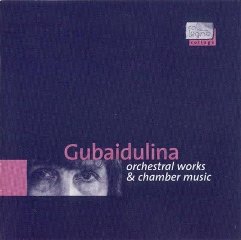Sofia Gubaidulina - Orchestral Works & Chamber Music (2000)
Sofia Gubaidulina - Orchestral Works & Chamber Music (2000)

1. String Trio_violin viola cello_1988 I 2. String Trio_violin viola cello_1988 II 3. String Trio_violin viola cello_1988 III 4. Hour of the soul_1974_ large orch mezzo-sopr & percuss 5. Night in Memphis_1968_Cantata mezzo-sopr male choir & orch Yevgeniya Alikhanova –Violin Tatyana Kokhanovskaya – Viola Olga Ogranovitch – Cello Lina Mkrtchyan - Mezzo-Soprano Mark Pekarsky - Percussion Moscow Chamber Choir Leningrad Philharmonic Orchestra Yuri Nikolayevsky - Conductor
This disc brings together three pieces by the Russian-Tatar composer Sofia Gubaidulina, among the greatest of modern composers and a very unique voice on the scene of contemporary composition. The pieces represented are on the periphery of Gubaidulina's most substantial work, but still worth listening to.
The "String Trio" for violin, viola, and vioncello (1988) is tremendously exciting. The first movement begins with scratchy austerity and eventually breaks into every interplay of the strings that one can imagine. The second movement has a clockwork rhythm reminiscent of Ligeti's second string quartet, while the third, final movement summarises what came before and breaks it down into a meditative lull. This piece fits with the most religious parts of Gubaidulina's oeuvre, such as her "Seven Words" for violin and bayan, or "Hommage a T.S. Eliot." This performance by Yevgeniya Alikhanova, Tatyana Kokhanovskaya, and Olga Organovich is, I feel, the best available. There is also a recording of the piece by the Danish Trio on CPO which is less satisfying but still worth tracking down. "Hour of the Soul", dating from 1974, is a setting of the second part of the poem of that name by Marina Tsvetaeva, whose poetry Gubaidulina further used in the a capella "Hommage a Marina Tsvetaeva". However, the first twenty minutes of this half hour-long piece are purely instrumental, and there is a use of percussion in some places reminiscent of the sixth and seventh parts of her "Johannes-Passion". The performance by the Leningrad Philharmonic Orchestra seems committed, and the singing of Lina Mkrtchyan is spine-tingling. I do not understand why this piece did not come to gain more attention after Gubaidulina's introduction to the West.
"Night in Memphis", a cantata written in 1968, is one of the few earlier Gubaidulina works available. A friend had asked her to set some Egyptian texts to music. As this predates Gubaidulina's commitment to Russian Orthodoxy and her drive to express her faith in music, the piece might fairly justly be called juvenalia. It is not a bad piece, but simply one that does not call the listener back to listen again very often. It is a pity that the recordings of the latter two pieces are less than ideal. "Hour of the Soul" has all the downsides of a live recording, with murmuring and coughing, while "Night in Memphis" is often nearly inaudible. "String Trio" is, happily, an exception and it is perhaps the finest recording of the piece available. The liner notes are sparse, and I would have preferred a libretto for the latter two pieces. This disc would probably be a dreadful introduction to Gubaidulina's work. If you have never heard anything by this greatest of contemporary composers, I'd recommend the OFFERTORIUM disc on Deutsche Grammaphon, the recent inexpensive disc on Naxos, or perhaps her "Johannes-Passion", which is her masterpiece and the greatest work of Christian piety of our time. If you're already a fan of Gubaidulina's ouevre and looking for more material, this is a good choice.
Last Updated (Tuesday, 21 July 2015 13:54)








